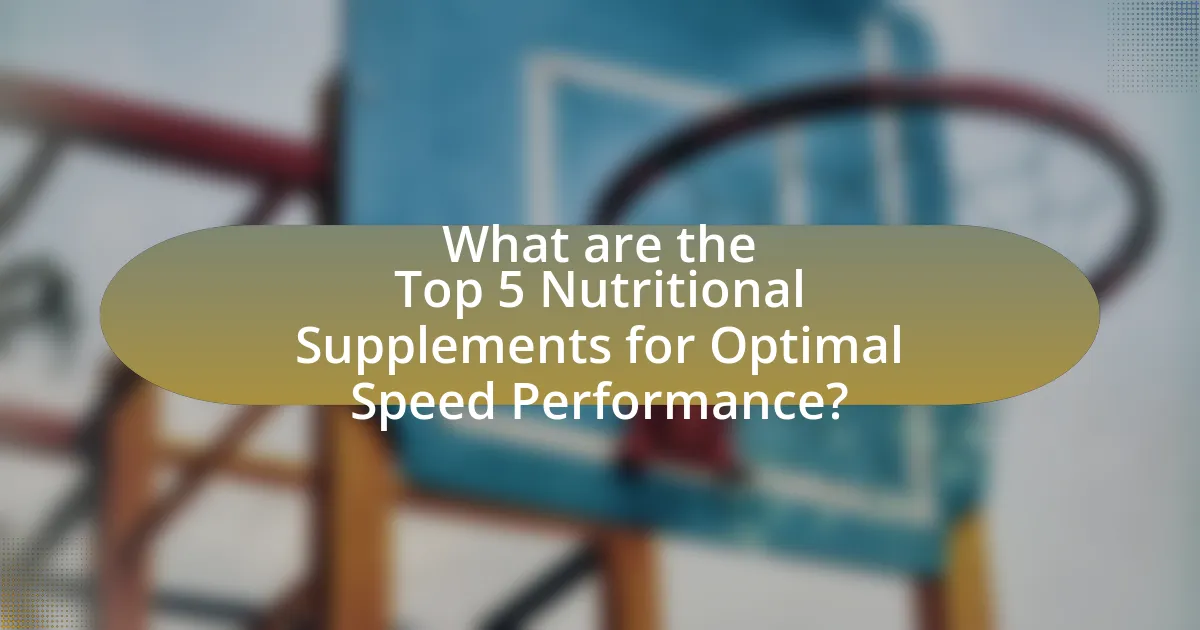The article focuses on the top five nutritional supplements that enhance speed performance: creatine, beta-alanine, caffeine, branched-chain amino acids (BCAAs), and nitric oxide boosters. It details how each supplement contributes to improved athletic performance by increasing energy availability, reducing fatigue, and aiding muscle recovery. The article also discusses the essential nutrients for speed enhancement, the interaction of these nutrients during physical activity, and the importance of supplementation for athletes. Additionally, it highlights best practices for integrating supplements into a training regimen, ensuring safety, and avoiding common mistakes.

What are the Top 5 Nutritional Supplements for Optimal Speed Performance?
The top 5 nutritional supplements for optimal speed performance are creatine, beta-alanine, caffeine, branched-chain amino acids (BCAAs), and nitric oxide boosters. Creatine enhances ATP production, which is crucial for high-intensity activities, leading to improved sprinting speed. Beta-alanine buffers lactic acid accumulation, delaying fatigue during intense exercise. Caffeine increases alertness and reduces perceived effort, allowing athletes to perform at higher intensities. BCAAs support muscle recovery and reduce muscle soreness, enabling faster training adaptations. Nitric oxide boosters improve blood flow and oxygen delivery to muscles, enhancing endurance and speed. These supplements are backed by numerous studies demonstrating their effectiveness in improving athletic performance.
How do these supplements enhance speed performance?
Supplements enhance speed performance by improving energy availability, reducing fatigue, and increasing muscle recovery. For instance, creatine supplementation has been shown to increase phosphocreatine stores in muscles, which can enhance ATP production during high-intensity activities, leading to improved sprinting speed. Additionally, beta-alanine can buffer lactic acid accumulation, delaying fatigue and allowing athletes to maintain higher speeds for longer durations. Research indicates that caffeine can enhance endurance and reduce perceived exertion, enabling athletes to perform at faster speeds. These mechanisms collectively contribute to enhanced speed performance in athletes.
What specific nutrients are crucial for speed enhancement?
Carbohydrates, proteins, and certain vitamins and minerals are crucial for speed enhancement. Carbohydrates provide the primary energy source for high-intensity activities, enabling athletes to sustain speed during performance. Proteins are essential for muscle repair and growth, which supports overall strength and speed. Additionally, vitamins such as B-complex vitamins play a role in energy metabolism, while minerals like magnesium and potassium are vital for muscle function and preventing cramps. Research indicates that a diet rich in these nutrients can significantly improve athletic performance, as evidenced by studies showing that carbohydrate loading enhances endurance and speed in competitive sports.
How do these nutrients interact with the body during physical activity?
Nutrients interact with the body during physical activity by providing energy, supporting muscle function, and aiding recovery. Carbohydrates serve as the primary energy source, fueling high-intensity exercise by replenishing glycogen stores in muscles. Proteins contribute to muscle repair and growth, essential for recovery post-exercise, as they supply amino acids necessary for tissue synthesis. Fats, while less immediate in energy provision, support prolonged endurance activities by serving as a secondary energy source. Additionally, vitamins and minerals play crucial roles in metabolic processes, such as energy production and muscle contraction, ensuring optimal performance. For instance, studies show that adequate carbohydrate intake can enhance endurance performance by up to 20%, highlighting the importance of these nutrients in physical activity.
Why is supplementation important for athletes focused on speed?
Supplementation is important for athletes focused on speed because it enhances performance, recovery, and overall physical capacity. Athletes engaged in high-intensity training require specific nutrients to support energy production, muscle repair, and optimal physiological function. For instance, studies have shown that creatine supplementation can increase muscle power output and improve sprint performance by up to 10% in trained athletes. Additionally, beta-alanine has been demonstrated to reduce fatigue and improve endurance during high-intensity efforts, which is crucial for speed-focused training. Therefore, targeted supplementation can provide the necessary support for athletes to achieve peak performance in speed-related activities.
What role does nutrition play in athletic performance?
Nutrition is crucial for athletic performance as it directly influences energy levels, recovery, and overall physical capabilities. Proper nutrition provides the necessary macronutrients—carbohydrates, proteins, and fats—that athletes require for optimal energy production, muscle repair, and endurance. For instance, carbohydrates serve as the primary energy source during high-intensity activities, while proteins are essential for muscle recovery and growth. Research indicates that athletes who consume a balanced diet rich in these nutrients can enhance their performance metrics, such as speed and endurance. A study published in the Journal of Sports Sciences found that athletes with adequate carbohydrate intake improved their performance by up to 20% compared to those with insufficient intake. Thus, nutrition is a foundational element that significantly impacts an athlete’s ability to perform at their best.
How can supplements fill nutritional gaps for athletes?
Supplements can fill nutritional gaps for athletes by providing essential vitamins, minerals, and macronutrients that may be lacking in their diets. Athletes often have increased nutritional needs due to higher levels of physical activity, which can lead to deficiencies in key nutrients such as protein, omega-3 fatty acids, and certain vitamins like D and B12. For example, a study published in the Journal of the International Society of Sports Nutrition found that protein supplementation can enhance muscle recovery and growth, addressing the increased protein requirements of athletes. Additionally, omega-3 fatty acids have been shown to reduce inflammation and improve joint health, which is crucial for athletes engaged in high-impact sports. By incorporating targeted supplements, athletes can effectively bridge these nutritional gaps, ensuring optimal performance and recovery.

What are the key benefits of each of the Top 5 Nutritional Supplements?
The key benefits of the Top 5 Nutritional Supplements for optimal speed performance are as follows:
-
Creatine: Creatine enhances ATP production, leading to improved strength and power output during high-intensity activities. Studies show that creatine supplementation can increase muscle mass and improve sprint performance.
-
Beta-Alanine: Beta-alanine increases carnosine levels in muscles, which helps buffer acid during intense exercise, delaying fatigue. Research indicates that beta-alanine can improve performance in high-intensity exercise lasting 1 to 4 minutes.
-
Caffeine: Caffeine acts as a stimulant that enhances focus and reduces perceived exertion, allowing athletes to perform at higher intensities for longer periods. Evidence suggests that caffeine can improve endurance and sprint performance.
-
BCAAs (Branched-Chain Amino Acids): BCAAs help reduce muscle soreness and fatigue during exercise, promoting quicker recovery. Studies have shown that BCAA supplementation can enhance exercise performance and reduce muscle damage.
-
Omega-3 Fatty Acids: Omega-3s support cardiovascular health and reduce inflammation, which can enhance recovery and overall performance. Research indicates that omega-3 supplementation can improve muscle recovery and joint health, benefiting speed performance.
How does Creatine contribute to speed performance?
Creatine enhances speed performance by increasing the availability of adenosine triphosphate (ATP), the primary energy carrier in muscle cells. This boost in ATP allows for more explosive energy during high-intensity activities, such as sprinting. Research indicates that creatine supplementation can improve sprint performance by approximately 5-15% in trained athletes, as shown in a meta-analysis published in the Journal of Sports Medicine, which analyzed multiple studies on creatine’s effects on athletic performance. This increase in energy availability directly correlates with improved speed and power output during short-duration, high-intensity efforts.
What are the mechanisms through which Creatine enhances speed?
Creatine enhances speed primarily by increasing the availability of adenosine triphosphate (ATP) in muscle cells, which is crucial for high-intensity, short-duration activities. When creatine is supplemented, it elevates phosphocreatine stores in the muscles, allowing for rapid regeneration of ATP during explosive movements. This mechanism supports improved performance in activities such as sprinting and weightlifting, where quick bursts of energy are required. Research indicates that creatine supplementation can lead to performance improvements of 5-15% in high-intensity exercise, as shown in a meta-analysis published in the Journal of Sports Medicine, which reviewed multiple studies on creatine’s effects on athletic performance.
What dosage is recommended for optimal results with Creatine?
The recommended dosage for optimal results with creatine is 3 to 5 grams per day. This dosage has been shown to effectively increase muscle creatine stores, enhancing performance in high-intensity exercise. Research indicates that a daily intake within this range supports improved strength, power, and muscle mass, as evidenced by a meta-analysis published in the Journal of Sports Medicine, which confirms the efficacy of creatine supplementation at these levels.
What role does Beta-Alanine play in improving speed?
Beta-Alanine enhances speed by increasing muscle carnosine levels, which buffers acid in muscles during high-intensity exercise. This buffering capacity allows athletes to sustain performance for longer periods, thereby improving speed in activities such as sprinting or high-intensity interval training. Research published in the Journal of Applied Physiology indicates that supplementation with Beta-Alanine can lead to significant improvements in exercise performance, particularly in activities lasting 1 to 4 minutes, where speed is crucial.
How does Beta-Alanine affect muscle endurance and speed?
Beta-Alanine enhances muscle endurance and speed by increasing carnosine levels in muscle tissue, which helps buffer acid during high-intensity exercise. This buffering capacity delays the onset of fatigue, allowing athletes to perform at higher intensities for longer periods. Research published in the Journal of Applied Physiology indicates that supplementation with Beta-Alanine can improve performance in activities lasting 1 to 4 minutes, demonstrating its effectiveness in enhancing both endurance and speed in athletic performance.
What are the potential side effects of Beta-Alanine supplementation?
Beta-Alanine supplementation can lead to side effects such as paresthesia, which is a tingling sensation typically experienced in the face, neck, and hands. This effect occurs due to the stimulation of nerve endings and is generally harmless, often subsiding within a few hours. Additionally, some individuals may experience gastrointestinal discomfort, including nausea or upset stomach, particularly when taking high doses. Research indicates that these side effects are dose-dependent, with lower doses being less likely to cause discomfort.
How does Caffeine impact speed performance?
Caffeine enhances speed performance by increasing alertness and reducing perceived exertion during physical activities. Studies indicate that caffeine consumption can lead to improved endurance and sprinting capabilities, with research showing that doses of 3-6 mg per kilogram of body weight can enhance performance in high-intensity exercise. For instance, a meta-analysis published in the Journal of Sports Medicine found that caffeine can improve time-trial performance by approximately 1-3%, demonstrating its effectiveness in boosting speed.
What is the optimal timing for Caffeine intake before performance?
The optimal timing for caffeine intake before performance is approximately 30 to 60 minutes prior to the activity. Research indicates that caffeine reaches peak plasma concentration within this timeframe, enhancing physical performance and endurance. A study published in the Journal of Sports Medicine found that consuming caffeine within this window can improve reaction time and overall athletic performance, making it a strategic choice for athletes seeking to maximize their capabilities.
How does individual tolerance to Caffeine vary among athletes?
Individual tolerance to caffeine varies significantly among athletes due to genetic factors, habitual caffeine consumption, and individual metabolic rates. Research indicates that genetic polymorphisms in the CYP1A2 gene influence caffeine metabolism, leading to variations in how quickly individuals process caffeine. For instance, some athletes may be classified as “fast metabolizers,” experiencing heightened effects from caffeine, while “slow metabolizers” may have prolonged sensitivity and side effects. Additionally, athletes who regularly consume caffeine may develop tolerance, reducing its ergogenic effects over time. Studies have shown that habitual caffeine users may require higher doses to achieve the same performance benefits compared to occasional users.

What considerations should athletes keep in mind when using these supplements?
Athletes should consider the safety, efficacy, and legality of supplements before use. Safety involves understanding potential side effects and interactions with other substances, as some supplements may cause adverse reactions or health issues. Efficacy requires athletes to evaluate whether the supplement has scientific backing for enhancing speed performance; for instance, creatine has been shown to improve high-intensity exercise performance in numerous studies. Legality is crucial, as certain supplements may be banned by sports organizations, risking disqualification or penalties; for example, substances like anabolic steroids are prohibited in competitive sports. Therefore, athletes must conduct thorough research and consult with healthcare professionals to ensure informed decisions regarding supplement use.
How can athletes ensure they are using supplements safely?
Athletes can ensure they are using supplements safely by consulting with healthcare professionals, such as sports dietitians or physicians, before starting any supplementation regimen. This consultation helps athletes understand the potential benefits and risks associated with specific supplements, as well as their interactions with medications or existing health conditions. Additionally, athletes should choose supplements that are third-party tested for quality and purity, as this reduces the risk of contamination or mislabeling. Research indicates that supplements certified by organizations like NSF International or Informed-Sport are more likely to meet safety standards, providing athletes with greater assurance of their safety and efficacy.
What are the signs of over-supplementation to watch for?
Signs of over-supplementation include gastrointestinal issues, such as nausea, diarrhea, and stomach cramps, as well as headaches and fatigue. These symptoms arise when the body receives excessive amounts of vitamins or minerals, leading to toxicity. For instance, high doses of vitamin A can cause liver damage, while excessive iron can lead to gastrointestinal distress and organ damage. Monitoring these signs is crucial for maintaining health and ensuring that supplementation remains beneficial rather than harmful.
How can athletes choose high-quality supplements?
Athletes can choose high-quality supplements by evaluating factors such as ingredient transparency, third-party testing, and scientific backing. High-quality supplements typically list all ingredients clearly, allowing athletes to avoid harmful additives and allergens. Third-party testing, conducted by organizations like NSF International or Informed-Sport, ensures that products meet safety and quality standards, providing athletes with confidence in their choices. Additionally, supplements supported by scientific research, such as peer-reviewed studies demonstrating efficacy, further validate their quality. For instance, a study published in the Journal of the International Society of Sports Nutrition highlights the benefits of creatine supplementation for enhancing athletic performance, reinforcing the importance of evidence-based choices.
What are the best practices for integrating supplements into a training regimen?
The best practices for integrating supplements into a training regimen include assessing individual nutritional needs, selecting high-quality supplements, timing supplementation appropriately, and monitoring progress. Assessing nutritional needs involves understanding dietary gaps and specific performance goals, which can be determined through consultation with a nutritionist or dietitian. Selecting high-quality supplements ensures that athletes consume products that are safe and effective; certifications from organizations like NSF International or Informed-Sport can provide assurance of quality. Timing supplementation, such as taking protein post-workout or creatine before training, can enhance performance and recovery. Monitoring progress through regular evaluations helps in adjusting supplement intake based on effectiveness and changing training demands. These practices are supported by research indicating that proper supplementation can improve athletic performance and recovery when tailored to individual needs.
How should athletes balance supplements with whole foods?
Athletes should prioritize whole foods for their nutritional needs while using supplements to fill specific gaps. Whole foods provide essential nutrients, vitamins, and minerals that support overall health and performance, while supplements can enhance recovery, energy, and muscle growth when dietary intake is insufficient. Research indicates that a diet rich in whole foods can improve athletic performance, as evidenced by a study published in the Journal of Sports Sciences, which found that athletes consuming a balanced diet had better endurance and recovery compared to those relying heavily on supplements. Therefore, athletes should aim for a foundation of whole foods, using supplements strategically to complement their diet as needed.
What timing strategies can maximize the effectiveness of supplements?
To maximize the effectiveness of supplements, timing strategies should align with the body’s physiological needs and the specific supplement’s action. For instance, consuming protein supplements within 30 minutes post-exercise can enhance muscle recovery and growth due to the anabolic window, which is supported by research indicating that muscle protein synthesis is significantly elevated during this period. Additionally, taking creatine before or after workouts can improve performance and recovery, as studies show that creatine supplementation enhances strength and power output when timed around exercise. Furthermore, fat-soluble vitamins like A, D, E, and K should be taken with meals containing fat to improve absorption, as demonstrated by research indicating that dietary fat increases the bioavailability of these vitamins. Overall, strategic timing based on the supplement type and individual goals can significantly enhance their effectiveness.
What common mistakes should athletes avoid when using nutritional supplements?
Athletes should avoid several common mistakes when using nutritional supplements, including neglecting to consult with a healthcare professional, relying solely on supplements instead of a balanced diet, and using unverified products. Consulting with a healthcare professional ensures that athletes choose supplements that are appropriate for their specific needs and health conditions. Relying solely on supplements can lead to nutrient imbalances, as whole foods provide essential vitamins and minerals that supplements may lack. Additionally, using unverified products can expose athletes to harmful substances or ineffective ingredients, as the supplement industry is not strictly regulated. These mistakes can hinder performance and overall health.
How can misinformation about supplements lead to poor choices?
Misinformation about supplements can lead to poor choices by causing individuals to select ineffective or harmful products. For instance, misleading claims about the benefits of certain supplements may result in athletes choosing products that do not enhance performance or, worse, contain banned substances that could lead to disqualification in competitive sports. A study published in the Journal of the International Society of Sports Nutrition found that many supplements are not rigorously tested for safety or efficacy, leading consumers to make uninformed decisions based on false advertising. This lack of reliable information can ultimately compromise health and athletic performance.
What are the risks of relying solely on supplements for performance?
Relying solely on supplements for performance poses significant risks, including nutrient imbalances, dependency on artificial sources, and potential health issues. Nutrient imbalances occur when individuals neglect whole foods, which provide essential vitamins, minerals, and macronutrients necessary for optimal bodily function. Dependency on supplements can lead to a lack of understanding of proper nutrition, diminishing the ability to achieve performance goals through natural dietary means. Additionally, excessive intake of certain supplements can result in adverse health effects, such as liver damage from high doses of fat-soluble vitamins or gastrointestinal distress from overconsumption of protein powders. Research indicates that a balanced diet is crucial for athletic performance, as evidenced by a study published in the Journal of the International Society of Sports Nutrition, which emphasizes the importance of whole foods over supplements for achieving optimal health and performance outcomes.


